The beach house kitchen will be our seventh kitchen project (!!!) after redoing three of our own (this one’s our favorite), a showhouse that we did in 2014, a spec house for a local builder in 2016 (seen below – we loved that blue tile), and a local teachers’ lounge that we redid last year.
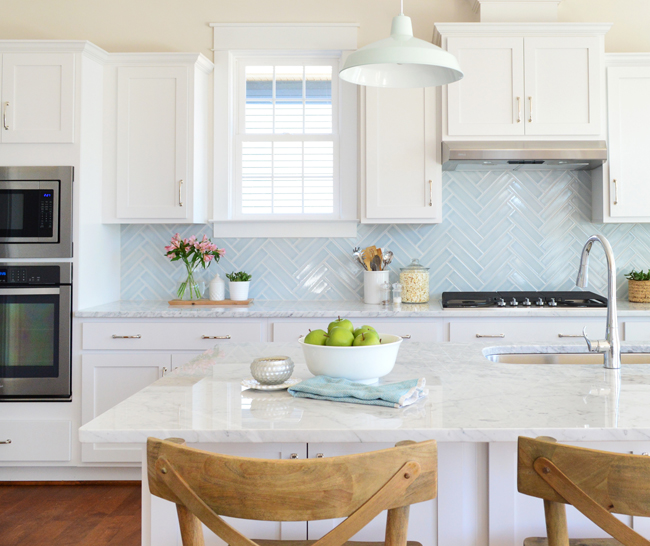
And while that sounds like a lot of kitchens to have under our belts, the process can still feel pretty daunting – probably just due to the sheer number of decisions that a kitchen reno brings. “What’s the most functional layout? Is that too many drawers or not enough? Will I live to regret the lighting? Is it all going to come in within budget?” So many questions. And decisions. And changing of minds.
But as much work as it is to plan, stress, overthink, and replan a kitchen – it can easily be one of the biggest improvements you can make to a house. And now that we’re so close to FINALLY installing the beach house kitchen (hello light at the end of the tunnel!), we thought we’d take you through the steps (and kitchen planning tools) that we used to make our plan.
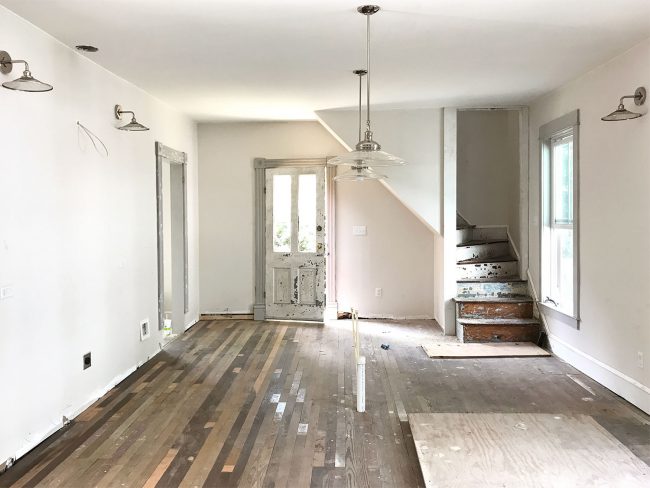
That photo above is what the space looked like as of last week. The lights are hung, trim is getting painted, and the floor holes are all patched with matching reclaimed pine. Once they’re sanded and sealed we can begin the kitchen install! It’s feeling very real all of a sudden. And it’s a far cry from what it looked like when we first started planning the space last year:
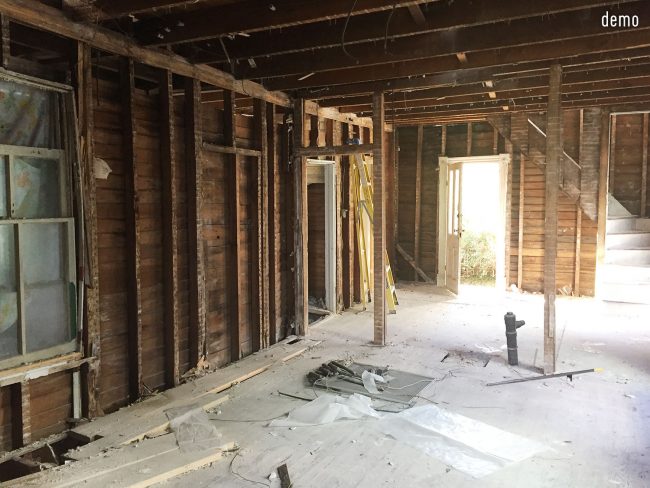
I won’t rehash all of the floor planning we did (it’s in this post) but you can see where we ended up below. Well, mostly ended up (the master bath got rearranged one more time to accommodate a shower). But the important part is the kitchen, which you can see in the upper left of these schematics:
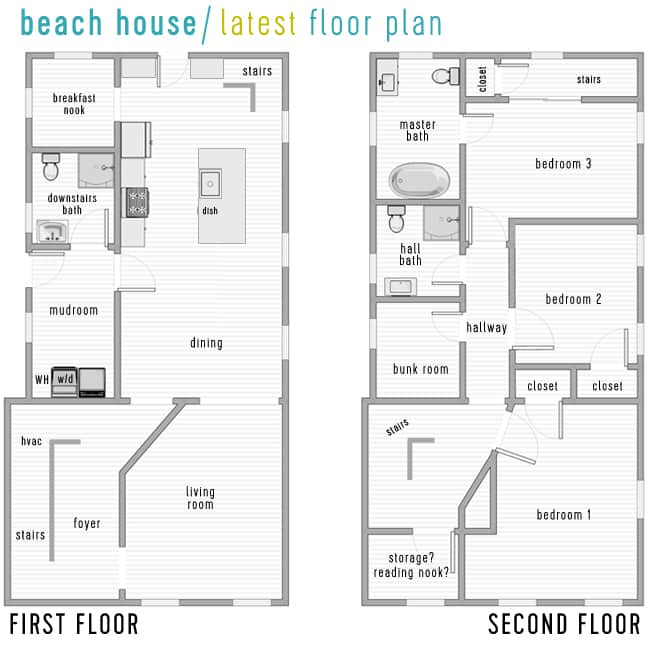
We made those initial floor plans in Photoshop (like I’m sure all the professional architects do…. right?) so it wasn’t precisely to scale and not even close to something we could rely on to order cabinets. So having made the decision to order our cabinetry from Ikea, we turned to their free 3D kitchen planning software.
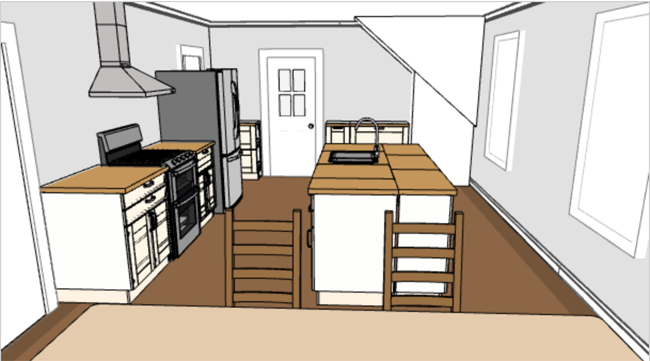
It’s not my favorite interface in the world (you can read all my pros & cons in this post) but if you’re using Ikea products, it’s a great way to plan the precise items you’ll need. We also used it when ordering our laundry room cabinets and our bonus room built-ins (shown below), both of which we’ve been very happy with – so Ikea was a no-brainer for keeping the beach house kitchen looking good, without costing a fortune.
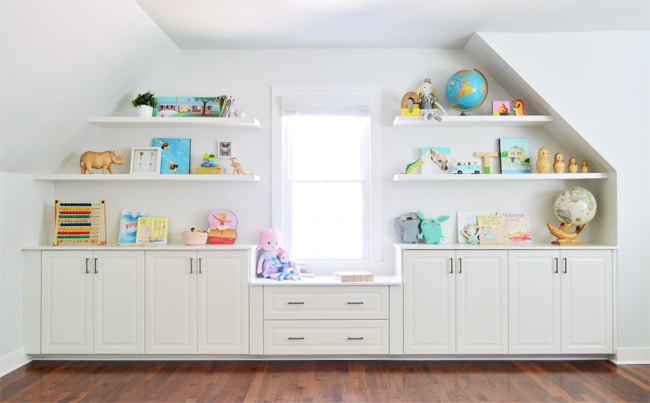
We went through a few different ideas and layouts within the software – like do we do upper cabinets or skip them? We eventually landed on no uppers, just because we’re suckers for open shelves and the cabinets were looking pretty heavy in the rendering, even in white (we want the room to feel balanced, not left-heavy with too much stuff on that wall as you walk into the room). And since this is going to be a weekly vacation rental, nobody is going to be living here for months on end, so we realized we’d have plenty of storage space for vacation goers – especially with the extra cabinets that we added to flank the back door.
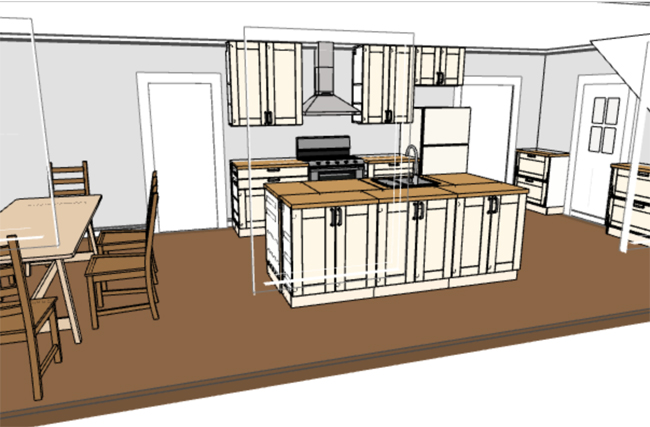
One challenge with the Ikea software is that you can’t pull in products that aren’t theirs – so I couldn’t render our 40″ pink stove or the exact dimensions of the fridge we’ve had our eye on. And I can never get their shelves to look the way I want (this is reminding me that I really need to relearn Google SketchUp). So the renderings are a little imperfect, but this one is probably the closest to what it’ll be like (just add sconces, pendants, and shelves in your mind).
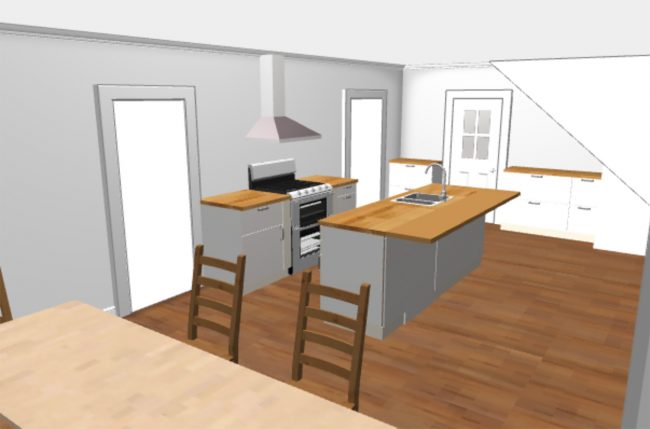
Before ordering, we also loosely mapped things out in real life to make sure we liked the clearance of everything. You can see our fancy stand-ins for the island. Not the big saw, just the wood scraps on the floor. Told you they were fancy.
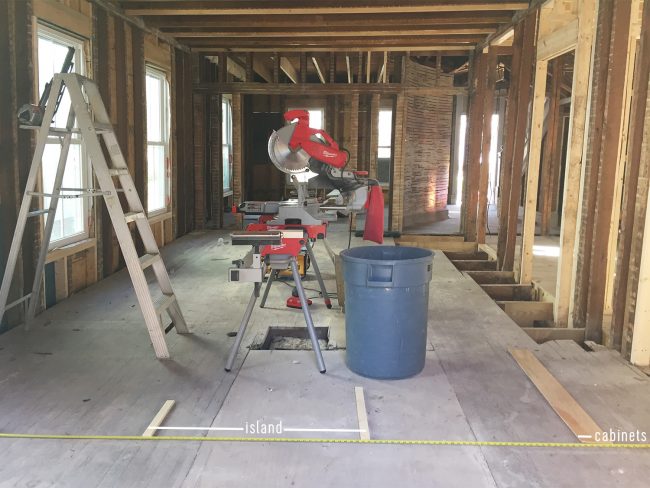
It’s also pretty hard to get a sense of the finishes in these renderings, so we ended up making some mood boards to be sure we liked the road we were headed down. Here’s the final one, but I’ll show you how we got to this mix in a second:

1. Stove / 2. Faucet / 3. Hood / 4. Sconces / 5. Island Pendants / 6. Counter (inspo pic) / 7. Cabinet doors / 8. Fridge (inspo pic)
From the get-go, Sherry and I both agreed we wanted this kitchen to feel casual and unfussy. The beach is supposed to be relaxing, so we wanted the kitchen to feel the same way. One of our first big inspiration pictures is shown above as #7, because it just looks very chill. Still plenty nice, but not too formal or uptight (which is generally right where we’re aiming with this beach house).
The flat-fronted cabinets really stood out to us in that picture because we’ve never been drawn to them before. They always struck us as crazy modern or too commercial (like a school cafeteria from the 90’s). But after hunting down more inspiration photos on Pinterest, we were officially flat-front converts for the beach house.
You’ll also notice that 4 out of these 5 photos don’t show upper cabinets, which further confirmed our lean towards a more unfussy/casual look with lots of open space for the eye to move around.
We haven’t chosen hardware yet because we’re waiting to see how everything looks once we have it installed – but the idea of leather pulls is pretty cool (and clearly they’re very popular with flat-front drawers). We’re considering a few other options, and we also might try to hunt down some wood knobs to play off of some of the old wood doorknobs in the house. We’re hoping the right choice will be much clearer once we can actually hold up some samples in the finished space, but here are a few of the ones we’re considering: 1 / 2 / 3 / 4 / 5 / 6 / 7 / 8 / 9
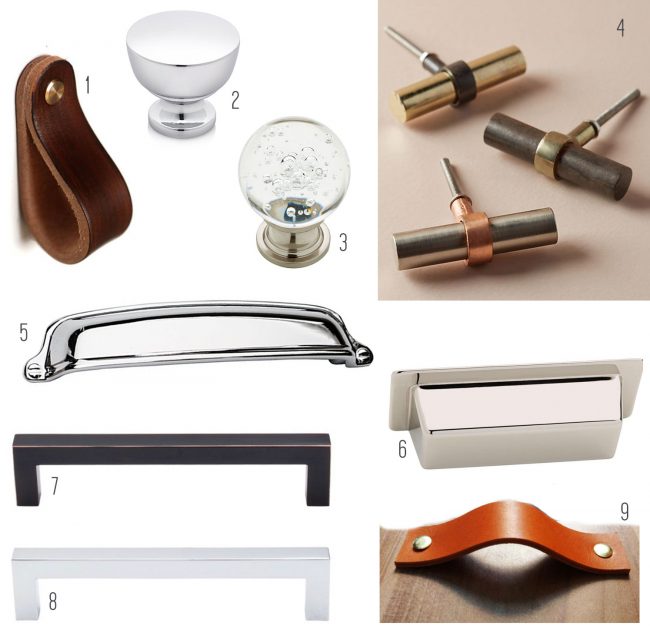
Another big source of inspiration for us is Orlando’s kitchen. He revealed it on Emily Henderson’s blog right around the time we were ordering ours, so it helped us lock in our decision to do butcher block counters (we actually switched our plan last minute to get the exact ones that he chose – these from Ikea). We even ordered extra butcher block so we can make our floating shelves from the same stuff.
People have mixed feeling about butcher block in a rental, but we like that it’s affordable (like 10 times more affordable than some other options) and we LOVE that we can sand and refinish any major beatings that it might take (can’t say that if someone cracks/scratches/stains an expensive stone slab). We’ve actually heard a ton of helpful info from those of you with butcher block counters about how to seal them / treat them so they look good and last, so we’ll definitely be sharing all of that once they’re in (and we’ll be honest about how they hold up too – so stay tuned for photos and stuff as they get used and abused).
Orlando’s kitchen was also reassuring because he used the exact fridge we were considering. We don’t have space for a large fridge and we worried this one might look cheap, but – phew! – it looks great.
All of these decisions were made back in April, and we happened to lock everything in right as Ikea was having their semi-annual Kitchen Event Sale (more on that in podcast episode #52). The total (for cabinets and counters) would’ve been about $3200 – but we got 20% off our entire order thanks to the sale. Which saved us about $600 and brought the total closer to $2,600. That even includes the sink, soft close drawers/doors, and a pull-out trash can!
But even with most of the big items ordered, we still had lighting to figure out. Our first challenge was actual brightness, because I, John Petersik, am a lighting over-thinker to the Nth degree. First, we nixed the idea of adding recessed can lighting because we worried it would feel too “new” for the look we wanted in this 100 year old house. We have a few recessed lights elsewhere, so we’re not totally against them for the house, but the kitchen/dining room ceiling is SUCH a large plane, we wanted to avoid having a bunch of glowing circles dotting those pretty extra-high ceilings.
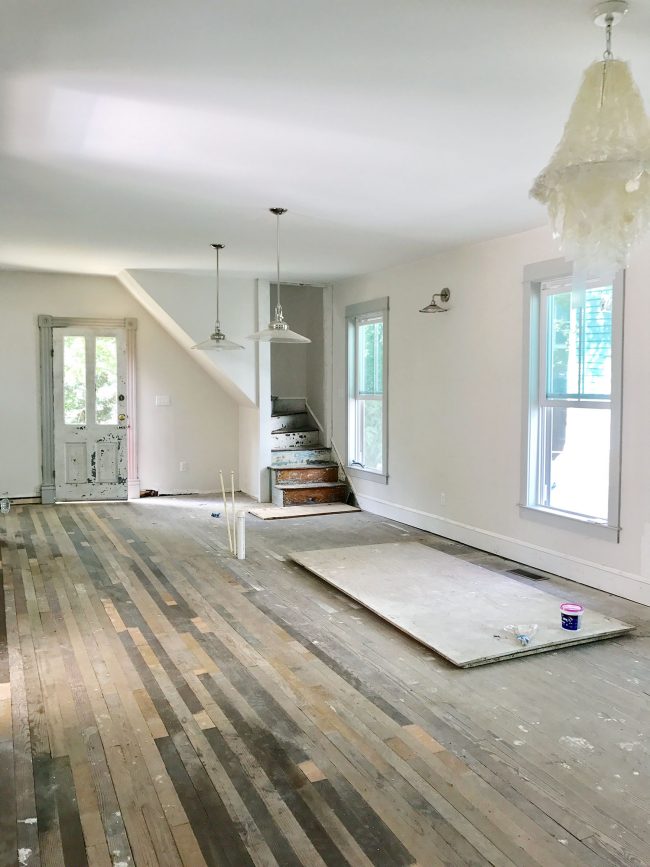
In the past we’ve relied on recessed lights to provide most of the functional lighting in our own kitchens, with pendants providing task and accent lighting. But in the beach house, our kitchen lighting – two island pendants and three sconces (along with two lights over the dining table nearby) – would need to do it all. So we quickly realized we needed to nix anything with a solid shade, so that every bulb could cast light in all directions instead of just shining it down. For instance, anything like the ones in our house’s kitchen were immediately out of the running. Sorry, guys.
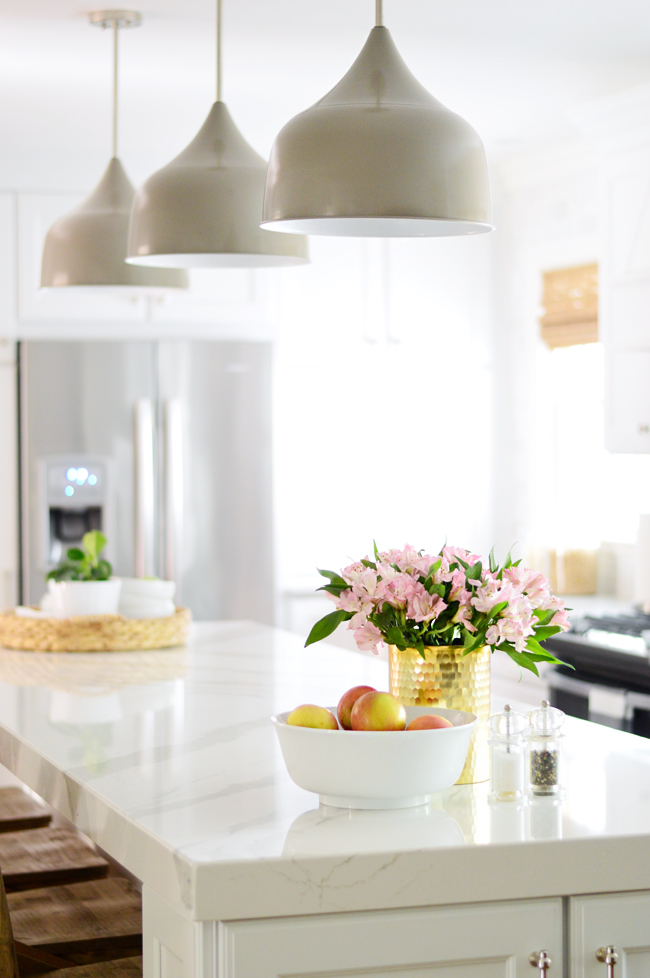
Even with that no-shades rule helping us narrow things down, we still had a ton of lights that we were considering. So I mocked up this graphic to get a better sense of how our options looked with the rest of the kitchen. This was a failed option we were just playing around with at first (note the solid shades on both the sconces and pendants) but it was a huge help to see things this way. The subway backsplash isn’t for sure either, just a nice simple choice that lets us focus on what lights could work best:
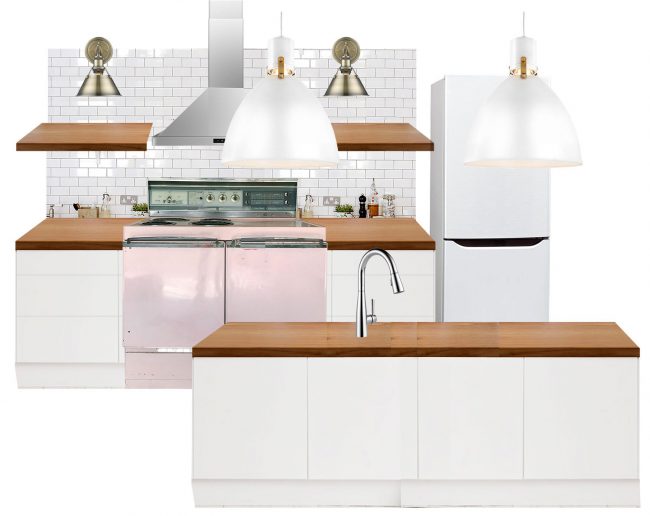
We considered a few multi-light pendants, but most of them got eliminated for being the wrong style (these felt too modern) or so large that they dwarfed the island (or broke the bank).
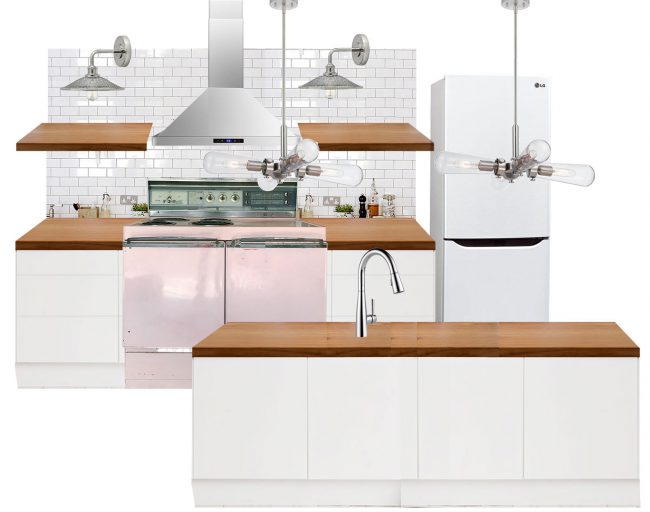
A lot of the lights we typically would choose in a heartbeat (like these guys from Ballard Designs) felt too traditional for the vibe we were going for once we saw them in the mockup. Much of that had to do with the pink stove I think. It’s really cool and old and fun, but it might not lend itself to anything too formal.
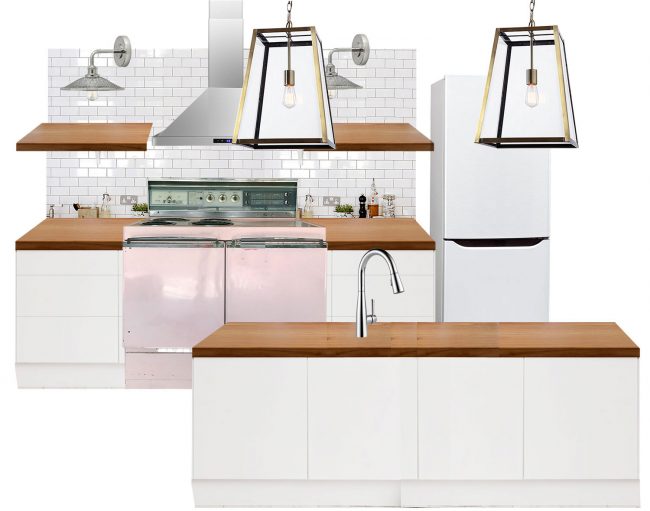
The other thing we started bumping up against was scale. For instance, we started to think these beauties were the answer to all of our problems: glass shades, vintage look, right finish…
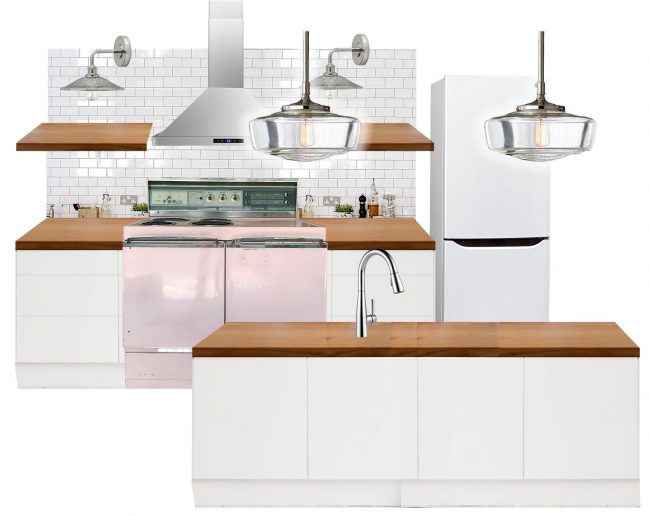
…but I was alarmed by 6″ measurement in its description (and that was the LARGER option they offered). My rendering above wasn’t to scale, so I started making a new version that was a bit more representative of size – particularly of the light in proportion to the eight foot island. That shed A LOT of light on the situation (pun completely intended). These were definitely too small.
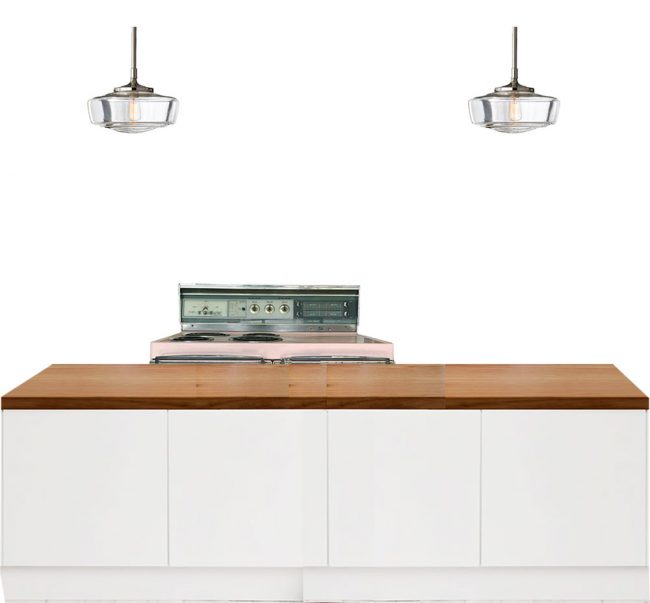
I’ll cut to the chase. We ended up with this, as you saw in the original mood board up top. The pendants are 15″ wide and the clear shades allow them to throw light in every direction.
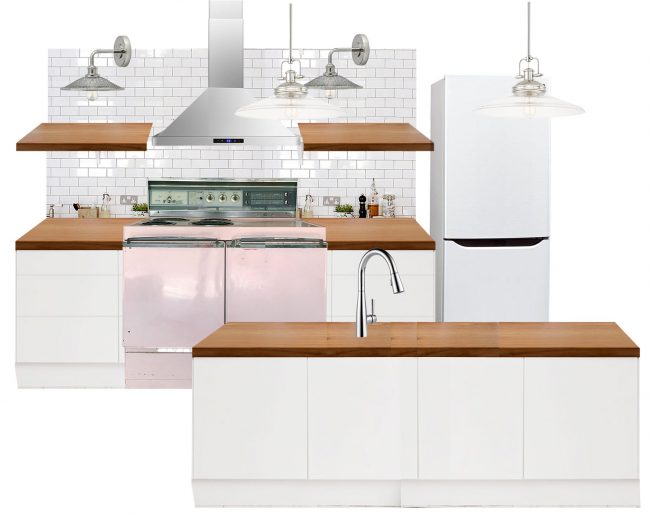
We love how large the glass shades are without feeling heavy. The room instantly feels a lot closer to “done” with them hung, like they’re just begging for an island to be there. And the rest of the cabinets. And the appliances.
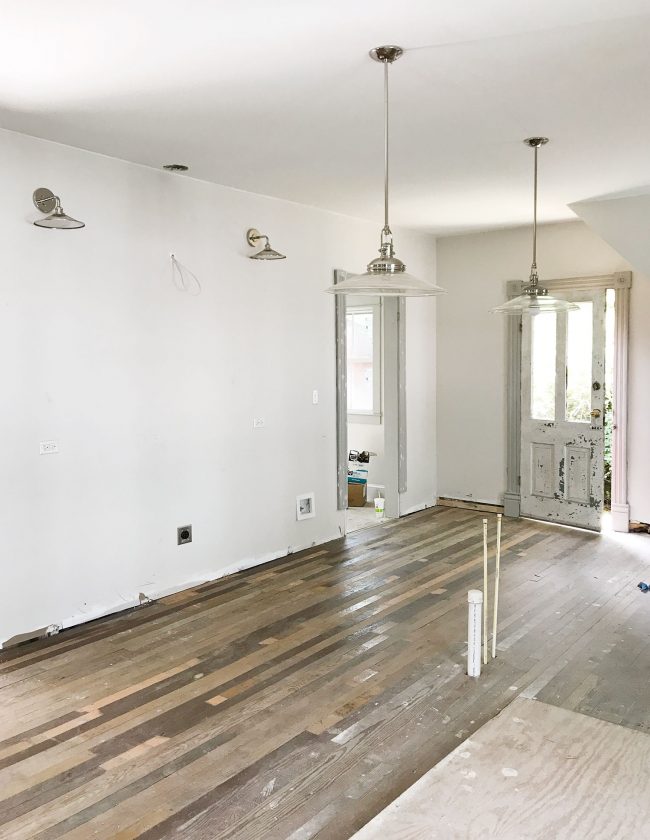
The sconces have shades that are wire mesh, so the light passes through them just like we wanted. We actually saw them in a showhouse shortly after ordering them and they looked GREAT all lit up. You can see how they’re not solid a bit better in this shot (there’s one more across the room too, which you can see in the second picture in this post).
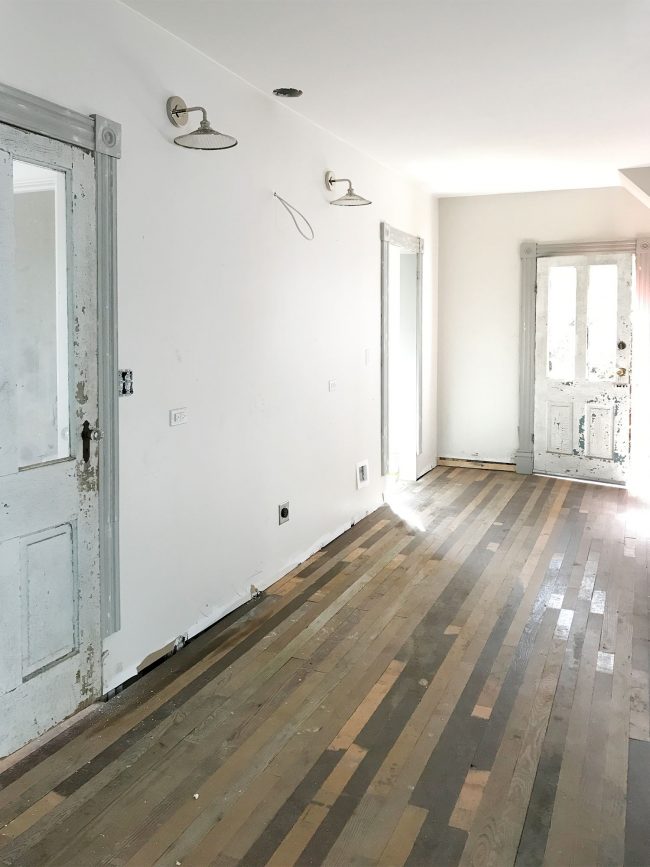
Okay and one last mock-up. We also did this one that included plans for the adjacent dining area, just to try to picture how that would work with everything going on in the kitchen. Of course it has a pair of capiz pendants, because it wouldn’t be a beach house without Sherry’s favorite material of all time.
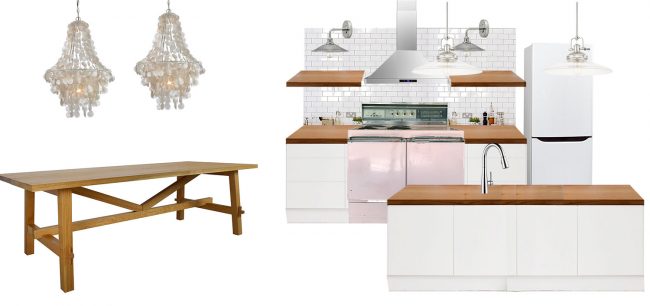
We opted for two lights over the dining table so that from the couch in the living room, the kitchen lights wouldn’t intersect at an odd place (once centered fixture would have). We also thought it would be fun to try two smaller pendants instead of one large chandelier. They don’t look great in the shot above because they’re hung higher than they’ll eventually go (and there’s no table under them to ground them). Oh yeah and the capiz is all still wrapped in its plastic shipping. Mummified capiz is the new black.
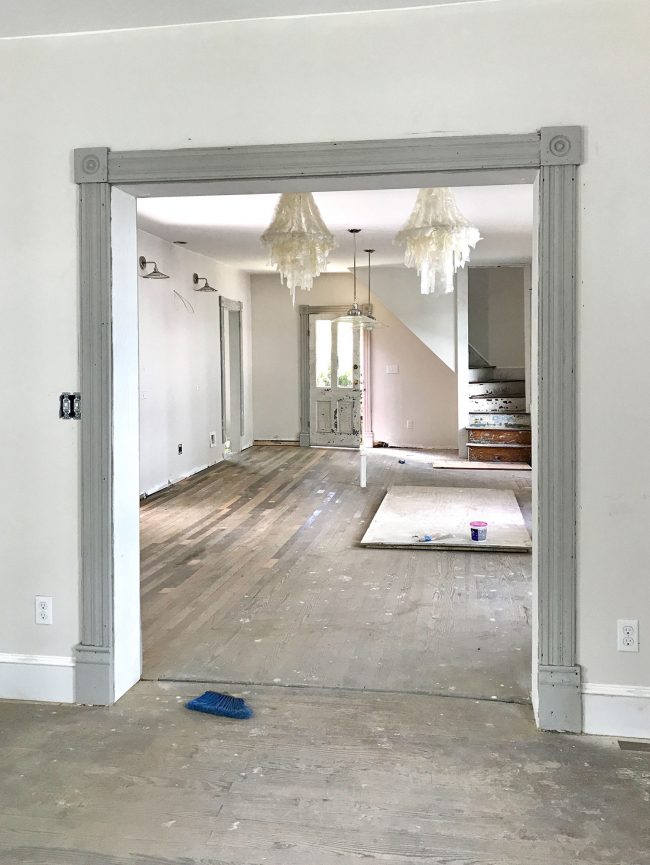
So that’s where we are. We’re headed out there soon to finish restoring the tub upstairs and to see how a few last floor repairs went upstairs. There are just a few tiny things on the to-do list (like finishing a railing for the back stairs) and then floor sanding and sealing can begin! After that, we can finally get started on making this kitchen come to life… and finally get those Ikea boxes out of our garage, which I’m also pretty stoked about.
Psst- You can read all about our past progress at the beach house by clicking into Our Beach House category.
*This post contains affiliate links
